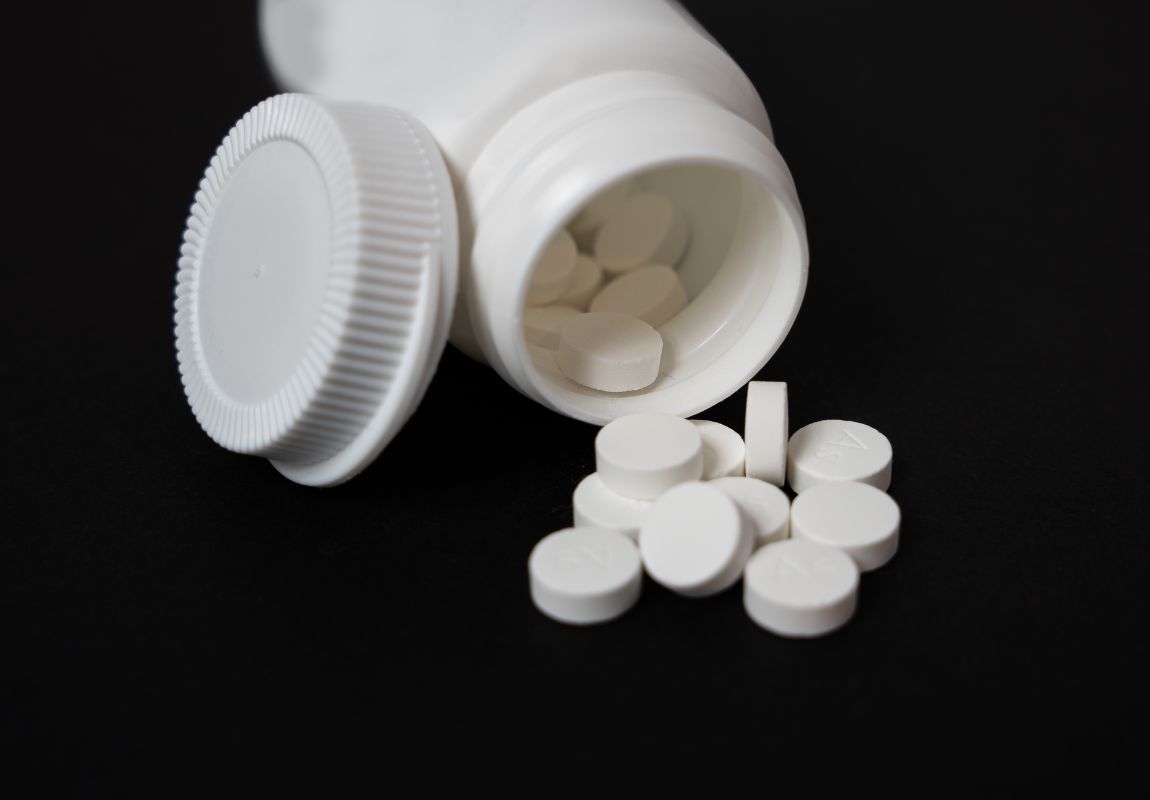Percocet is a prescription opioid painkiller that contains oxycodone and acetaminophen. It’s prescribed for the treatment of moderate to severe pain but has a high potential for abuse. Some people crush up Percocet tablets and smoke them to intensify the high, which can cause serious health issues.
What Is a Percocet?
Percocet is a brand-name painkiller that’s part of a family of drugs known as opioids. It contains two drugs – oxycodone and acetaminophen (the active ingredient in Tylenol®). Oxycodone is an opioid that blocks the brain’s pain signals and triggers the release of dopamine, which causes a euphoric high. Acetaminophen is an over-the-counter pain reliever.
Percocet comes in tablet form in various strengths, usually ranging from 2.5mg to 10mg of oxycodone per pill. Colors include blue Percocet, yellow Percocet, and white Percocet, but there’s no difference between them.
Percocet is most often prescribed for intense, short-term pain felt after surgery or traumatic injury. It can also help manage the chronic pain that accompanies conditions like arthritis or cancer. Opioids like Percocet are extremely addictive, even when used as prescribed. In fact, 2.702 million individuals aged 12 and up qualified as having an opioid use disorder in 2020.1 In 2021, 75,673 opioid overdose deaths were recorded.
Vicodin vs. Percocet
Many people assume Vicodin and Percocet are the same drug, but this isn’t the case. They’re both prescription opioid pain medications that contain acetaminophen, but Vicodin contains hydrocodone, whereas Percocet contains oxycodone.
What does Percocet feel like?
Percocet triggers the release of endorphins, your brain’s feel-good chemicals. Endorphins hide the perception of pain and boost feelings of pleasure, creating a temporary but powerful sense of well-being. The opioid component of the drug can cause tolerance to build quickly. People regularly taking Percocet will need increasingly larger doses to feel the desired effect, often leading to opioid addiction and other negative health issues.
Smoking Percocet: A Bad Idea
While Percocet is intended to be swallowed whole, some people crush the pills into powder and smoke it for a faster, more intense high. Prescription drug smoking has become a major trend among socially active young people in the U.S., with one study showing that 18.1% of socially active youth reported smoking prescription drugs.
When smoked, the effects don’t last as long. As a result, individuals who smoke Percocet are more likely to take it in a binge-like fashion. This increases the risk of overdose due to the difficulty of measuring doses.
Smoking Percocet is dangerous. In the short term, you may experience:
- Shallow breathing
- Drowsiness
- Flushing
- Mood changes
- Dry mouth
- Loss of appetite
- Constricted pupils
- Nausea, vomiting
- Constipation
- Dizziness
In severe cases, chest pain, seizures, problems breathing, or convulsions can occur. The combination of oxycodone and acetaminophen is also toxic for the liver when smoking.
What Are the Signs of Percocet Abuse?
Prescription painkiller abuse is a widespread problem in the U.S. and around the world, with the National Institute on Drug Abuse (NIDA) reporting that over 2 million people in the U.S. suffered from a substance use disorder related to the drugs in 2012.
Many people who become addicted to Percocet began taking the prescription innocently. They may have been recovering from a medical procedure and taking the pain medication at an appropriate dose. When you take opioids like Percocet repeatedly over time, your body slows its production of endorphins. The same dose of opioids stops triggering such a strong flood of good feelings. This is called tolerance. One reason opioid addiction is so common is that people who develop a tolerance may feel compelled to increase their doses to keep feeling good. Frequent use of Percocet often leads to physical and psychological dependence.
Researchers have found that taking opioid medications for more than a few days increases your risk of long-term use, which increases your risk of addiction. There are many physical, emotional, and behavioral signs of opioid addiction. A few of the most significant ones are:
- Being unable to stop using opioids, even if you want to
- Taking more than prescribed
- Neglecting responsibilities
- Relationship conflicts, new relationships with those who share addictive behaviors
- Financial issues
- Poor performance at school or work
- “Doctor shopping” for prescriptions
- Having withdrawal symptoms upon stopping
Percocet Withdrawal Symptoms
Even when prescribed and used properly to treat pain, Percocet dependence can develop. Although becoming dependent on a drug doesn’t necessarily mean that someone is addicted to it, the two often go hand-in-hand. In either case, quitting will cause withdrawal symptoms that are unbearable, especially within the first three days.
Several factors, including age, weight, overall physical and mental well-being, as well as the level of addiction or dependence, contribute to the progression and severity of withdrawal. Withdrawal symptoms typically show up within 24 hours of removing the drug from your system and may hang around for a week or even longer.
Common Percocet withdrawal symptoms include:
- Abdominal cramps
- Anxiety and restlessness
- Chills
- Diarrhea, nausea, and vomiting
- Dilated pupils
- Excessive yawning
- Heavy sweating
- Muscle pain and weakness
- Nightmares and hallucinations
- Rapid heartbeat and elevated blood pressure
- Runny nose
Most of the physical symptoms subside during the first week of the Percocet withdrawal process.
What Is Opioid Addiction Treatment Like?
In order to recover from an opioid addiction, you need to learn what caused it in the first place. This is best done in a treatment program. Seeking treatment for Percocet or other opioid addiction involves multiple steps for a successful recovery:
Medical detox – Percocet withdrawal causes unpleasant symptoms that are best managed under medical supervision. Detox removes the drug from your system, with the help of medications to ease cravings, anxiety, and body aches.
Rehab program – Behavioral therapies help build coping skills for staying clean. Counseling also treats any co-occurring mental health disorders (such as depression and anxiety).
Support system – Peer-support groups provide community and accountability. Narcotics Anonymous meetings offer a safe space to share experiences.
Aftercare plan – Ongoing outpatient counseling, sober housing, 12-step meetings, and other recovery support services help maintain sobriety.
Opioid Abuse Treatment at Aliya Health Group
Overcoming an opioid addiction is a challenging process. But seeking help to stop using Percocet can lead to a healthy, fulfilling life free of substance dependence.
Detox
With 10 treatment centers across the country, Aliya Health Group offers a wide variety of options for opioid addiction. Depending on the severity of your addiction, we may recommend you begin with detox. Once the Percocet is out of your system, we’ll work with you to identify the treatment program that best meets your needs. We always recommend going from detox into a treatment program. Otherwise, your risk of relapse is very high.
Therapy
Whether it’s an outpatient or residential program, your treatment will also involve behavioral therapy, such as acceptance and commitment therapy (ACT), cognitive behavioral therapy (CBT), group therapy, family therapy, and individual therapy. Building a successful and happy life free of opioids means replacing the drug with healthier habits and coping skills. That’s why we incorporate wellness activities into treatment, including biofeedback, nutrition, and acupuncture.
Aftercare
Thorough aftercare is available from the moment you leave our facility. We offer comprehensive case management services, so you have critical support in place when you leave addiction treatment. Depending on your location, we may connect you with dentists, physicians, nutritionists, and cardiologists who can address needs that may haven’t gotten the attention they needed during active addiction.
We believe anyone can obtain long-term recovery from Percocet, and we’re committed to offering the exceptional treatment and essential support needed to do so. If you or your loved one are struggling with opioid addiction, contact us today.
References:
- Drug Abuse Statistics | National Center for Drug Abuse Statistics
- Chasing the Bean: Prescription Drug Smoking among Socially Active Youth | J Adolesc Health
- National Institute on Drug Abuse Testimony to Congress | National Institute on Drug Abuse
- Drug Overdose Death Statistics | National Institute on Drug Abuse
- The prescription opioid epidemic: a review of qualitative studies on the progression from initial use to abuse | Dialogues Clin Neurosci
- Narcotics Anonymous



















